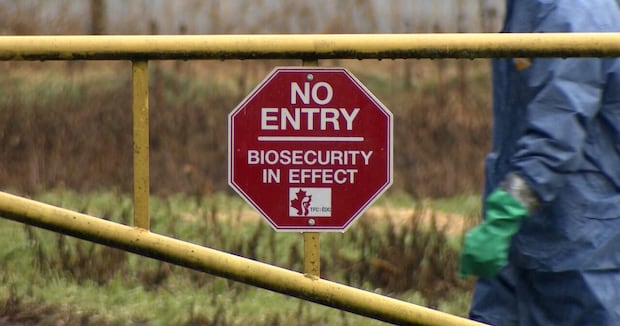British ColumbiaAvian flu has broken out in at least seven locations across B.C.’s Fraser Valley this month, with six cases cropping up since Thursday, and local farmers are doing all they can to protect their flocks.B.C. farms are under lockdown, with birds kept in barns, farm gates closed and disinfection protocols in placeLauren Vanderdeen · CBC News · Posted: Oct 27, 2025 11:46 AM EDT | Last Updated: 2 hours agoListen to this articleEstimated 3 minutesFarms affected by the avian flu outbreak are under tightened biosecurity measures. (CBC)Avian flu has broken out in at least seven locations across B.C.’s Fraser Valley this month, with six cases cropping up since Thursday, and local farmers are doing all they can to protect their flocks.The Canadian Food Inspection Agency (CFIA) has confirmed seven commercial poultry farms in Abbotsford and Chilliwack are infected with highly pathogenic avian influenza.Fraser Valley egg farmer Mark Siemens said avian flu has become an increasingly stressful problem in B.C.“It’s become an annual battle with farmers trying to keep their birds safe and healthy,” he said.All commercial farms in the province are in a biosecurity lockdown, according to Siemens: the birds are kept in the barns, farm gates are closed, all arriving vehicles must be disinfected, and every worker has to change their clothes and wear personal protective equipment.“A lot of disinfectant being used everywhere to try to keep that disease out,” Siemens said.Mark Siemens, a B.C. egg farmer, says local farms are now battling avian flu on a yearly basis. (Kier Junos/CBC)Siemens experienced an avian flu outbreak last year. An outbreak means all the exposed birds on a farm must be culled.“You spend your whole life taking care of these chickens…. It’s a traumatic experience for a farmer,” he said.Shawn Hall, spokesperson for the B.C. Poultry Association, said avian influenza is primarily spread by migrating waterfowl, including ducks, geese and swans, who spend their summers in the Arctic and then fly to their wintering grounds.B.C. is right on the flyway.“We know that the bio-security measures that we take are reducing risk to farms,” Hall said. “We are still seeing infections. There’s a lot of science underway right now, some research projects with the province to further investigate.”He pointed to one research project studying air filtration in barns.“We’re taking every measure that we know right now, and we’re investigating other measures, and whether they might also make a difference.”Hall also emphasized that avian flu is not a food safety issue.“The poultry, the chicken, the turkey, the eggs that you’re buying in your store are just as safe now as they ever have been. Canada has some of the most stringent food safety regulations anywhere in the world and appropriately so.”WATCH | Migration season sees increase in B.C. avian flu outbreaks:Avian flu cases spike at at least 5 Fraser Valley poultry farmsB.C.’s Fraser Valley is seeing a sudden spike in avian flu cases. New infections have hit a number of commercial poultry farms in the past week, as the risk level due to wild bird migration season increases. As Kier Junos reports, farmers are now taking extra precautions.Hall said an outbreak of highly pathogenic avian flu on a farm is effectively 100 per cent fatal to the exposed birds.“It spreads rapidly and is pretty much 100 per cent fatal with chickens and turkeys,” Hall said.“No farmer wants to have an infection on their farm. It’s devastating. These are smaller family farms here in British Columbia for the most part. There’s several hundred poultry farms in B.C. and for us, it’s all about raising local food for British Columbians.”Both Hall and Siemens said the risk of avian flu has increased since 2022.The CFIA estimates 8.8 million birds in B.C. have either died or been culled due to the highly pathogenic avian flu subtype. The number is more than half of all the birds affected in Canada.ABOUT THE AUTHORLauren Vanderdeen is a web writer for CBC British Columbia. She formerly worked for community newspapers, including the Burnaby Now and New West Record. You can reach her at lauren.vanderdeen@cbc.ca.With files from Kier Junos
Avian flu strikes farms in B.C.’s Fraser Valley, with 7 outbreaks this month











